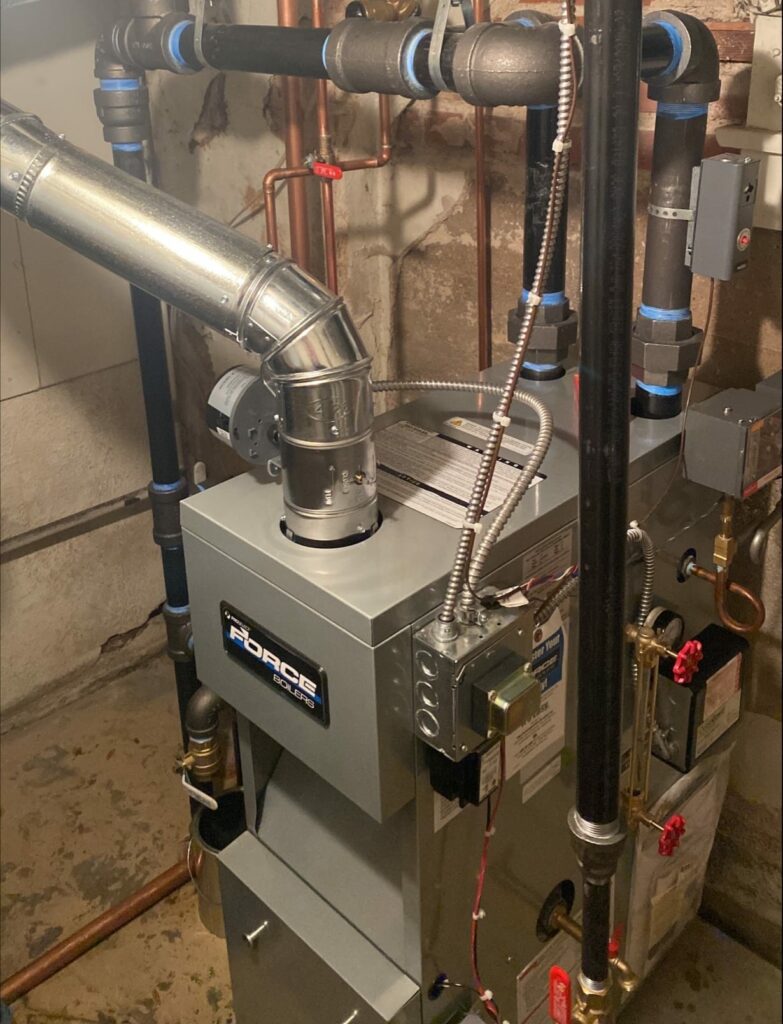
As a Denver homeowner, you rely on your boiler to keep your home warm and comfortable, especially during the frigid winter months. A well-functioning boiler ensures efficient heating and helps prevent unexpected breakdowns that could leave you in the cold.
However, like any home appliance, your boiler in Denver experiences wear and tear over time. Ignoring early warning signs of boiler trouble can lead to costly repairs—or even a complete system replacement. In this blog post, we’ll help you recognize common signs that your boiler may need professional attention so you can address issues before they become major problems.
At Bell Plumbing, Heating, Cooling & Electrical, we’ve been keeping Denver homes warm since 1926. If you suspect your boiler isn’t working as it should, our expert Denver heating team is here to help.
Before diving into the warning signs of boiler trouble, it’s helpful to understand how your boiler functions and the key components that keep it running smoothly.
A boiler is a closed system that heats water to generate steam or hot water, which is then distributed throughout your home via radiators, baseboard heaters, or radiant floor systems. Unlike furnaces, which heat air and use ductwork to distribute warmth, boilers provide a more even and efficient form of heating.
There are several types of boilers, but two of the most common are:
A boiler consists of several essential parts that work together to produce heat efficiently:
Understanding how your boiler works can help you identify problems early. If something doesn’t seem right—whether it’s strange noises, uneven heating, or rising energy bills—it may be time for a professional boiler repair.
In the next section, we’ll discuss the most common signs that you need boiler repair in Denver or the surrounding area, and when it’s time to call Bell Plumbing, Heating, Cooling & Electrical for expert assistance.
If your boiler starts making banging, whistling, or gurgling sounds, it could indicate air in the system, low water pressure, or failing components. These noises are not typical and should be inspected promptly.
Experiencing uneven heating or cold spots in your home? This may suggest issues with your thermostat, radiators, or internal components of the boiler.
A sudden spike in your heating costs can be a sign that your boiler is operating inefficiently, possibly due to worn-out parts or sediment buildup.
Visible water around the boiler is a clear indication of a problem, such as a faulty pressure valve or corrosion. Addressing leaks promptly can prevent further damage.
Unusual smells, especially metallic or sulfuric odors, could indicate gas leaks or overheating components. These are serious issues that require immediate professional attention.
If your boiler turns on and off repeatedly (a process known as short-cycling), it can signal thermostat issues, improper water pressure, or an oversized boiler.
A yellow or flickering pilot light may indicate carbon monoxide presence or ventilation problems. Ensure your pilot light is a steady blue; if not, it’s time for a check-up.
Regular boiler maintenance in Denver is key to preventing many common boiler issues. Scheduling annual inspections with qualified professionals ensures your system operates efficiently and safely. Routine maintenance can extend the lifespan of your boiler and help you avoid unexpected breakdowns.
If you notice any of the signs mentioned above, it’s advisable to seek professional assistance. Choosing a reputable boiler repair service in Denver ensures that the issue is diagnosed accurately and resolved efficiently. At Bell Plumbing, Heating, Cooling & Electrical, our experienced technicians are ready to assist you with all your boiler needs.
Being proactive about your boiler’s health ensures a warm and comfortable home. By staying vigilant and addressing issues promptly, you can maintain the efficiency and longevity of your heating system. Remember, for any Denver boiler repair or maintenance services, Bell Plumbing, Heating, Cooling & Electrical is here to help. Contact us today to schedule a service or inspection!
We’re ready to answer your questions or schedule your appointment, call now or book online!
